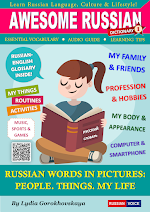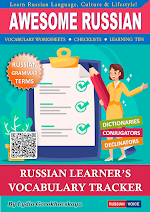Hello, my dear friend! If you are reading this article, you might be interested in learning the Russian language from scratch and do not know where to start. Being a Russian teacher, I often hear many questions from my novice students. How to start learning Russian? Is Russian a difficult language? Is Russian worth to study nowadays? So let’s learn how to learn Russian and prepare carefully to your Russian learning journey.
Subscribe to my YouTube channel Russian Voice Online School to learn Russian vocabulary and grammar, listen to podcasts and stories in easy Russian.
1. Get used to the sound of the Russian language
Listening is a core skill that all Russian students should improve. So I always advise my students to listen as more Russian as they can. If you like the music of language, it will be easier to acquire it. If you are a novice student and want to know how the Russian language sounds, I recommend you to start with listening to Russian songs.
Here is a list of the most popular Russian songs!
2. Learn the Russian alphabet and pronunciation rules
Learning how to read, write, and pronounce Russian letters is a must for beginners. The Russian language uses the Cyrillic alphabet. Some letters are the same as in the English alphabet, but others are different, so it’s important to take the time to learn Cyrillic.
I know that many beginner students want to simplify their studying and prefer to avoid learning Russian letters and pronunciation rules. Avoid this mistake!
Of course, you can use textbooks or online resources that offer transliterating of Russian words and phrases. However, Latin transliteration does not reflect the correct pronunciation of Russian words because of a difference of English and Russian sounds. The Russian phonetic category of hardness and softness does not exist in the most of European languages. It is very important to know, as it is a key to an understanding of Russian cases endings. So we need to learn and practice Russian spelling and phonetics right from the start.
How to do this? I recommend you to start with my course Awesome Russian Basics. With its help, you will master the Russian alphabet and learn how to read and write your first Russian words, phrases, and simple stories.
The course includes:
- Interactive PDF textbook with handwriting practice;
- Audio guide (links and QR-codes);
- List of the Russian alphabet with the right pronunciation;
- Big and clear examples that show you how to trace block letters by following arrows;
- Introduction to Russian phonetics;
- Pronunciation and spelling rules;
- Russian phonetic exercises;
- Words and phrases with stress marks and English translation;
You will learn how to read and write:
- 300+ basic Russian words and phrases on various topics: people, things, jobs, food, days of the week, months, colors, countries and cities, numbers, personal and possessive pronouns, questions, daily activities;
- 7 stories in easy Russian: It’s Moscow!; My Family; My Bag; My Apartment; My Room; My City; My Smartphone;
- 16 Russian motivational quotes about studying and learning.
3. Learn cognates and false friends
Russian language has many words borrowed from English, French, German and Latin. Even if you know a little Russian, you can catch familiar words and understand the context.
Let’s learn some of them!
Аме́рика [a-M'E-rika]– America
аэропо́рт [aera-PORT]– airport
ви́део [VEE-dia]– video
Интерне́т [intyr-NET]– Internet
кафе́ [ka-FE]– cafe
класс [klas]– class
компью́тер [kamp-YOO-ter]– computer
лифт [leeft]– lift; elevator
меню́ [mi-N'OO]– menu
па́спорт [PASS-part]– passport
студе́нт [stoo-D'ENT]– student
телефо́н [tili-FOHN]– telephone
фильм [feel'm]– movie
футбо́л [foot-BOHL]– football (soccer)
However, there are also many false cognates or “false friends” in Russian. These are the words that sounds familiar or look similar to words in English but have different meaning.
Here you will find several false cognates with definitions and examples that illustrate the difference.
Let’s look at some examples!
Магазин vs Magazine
Магазин [maga-ZEEN]- shop
Журнал [zhoor-NAL]- magazine
Фамилия vs Family
Фамилия [fa-MEE-liya]- surname
Семья [sim-YA] - family
Learning a new language always starts with mastering the basic vocabulary. If you know the most common words and phrases, you will be able to hold basic conversations with native speakers, read street signs and simple texts, listen to songs and podcasts, understand announcements in transport, etc.
How to learn Russian basic vocabulary effectively
For my beginner students I created a series of Awesome Russian Picture Dictionaries. These books will help you to study Russian vocabulary easily, improve your reading and writing skills, and turn learning Russian into a fun and fascinating process!
Each Russian picture dictionary includes:
- Interactive PDF eTextbook which you can read on any device;
- A Russian-English audio guide which will allow you to listen to the correct pronunciation of a word;
- Downloadable PDF workbook with Russian-English word bank and handwriting practice;
- 21 essential vocabulary topics;
- Over 350 Russian words and verb phrases illustrated with beautiful pictures;
- Stress marks for easier reading;
- Tips for learning Russian vocabulary.
AWESOME RUSSIAN Dictionary 1. Russian-English Word Bank: People. Things. My Life includes the vocabulary on the following topics:
- Family and Friends,
- Jobs and Hobbies,
- Body and Appearance,
- Personal Things,
- Computer and Smartphone,
- Music, Sports, and Games.
The book includes over 50 Russian verb phrases for beginners. So you will be able to talk about your daily routines and activities.
AWESOME RUSSIAN Dictionary 2. Russian Words in pictures: Food. Shopping. Numbers will help you learn and practice Russian numbers.
You will see how Russian money looks like and learn how to name Russian currency.
You will get to know how to tell the time, your phone number, and your address.
You will learn the names of Russian food and meals, clothes, and cosmetics.
You will know what gifts to present to your Russian friends.
Also, if you have kids, it will be useful to know some names of kids' stuff and toys.
AWESOME RUSSIAN Dictionary 3. Russian Words in pictures: Traveling. Calendar. My House will teach you the names of countries and cities, means of transport and places in the city.
You will get to know how to name furniture and home stuff.
You will learn Russian days of the week, seasons, and months.
Also, you will get acquainted with Russian symbols and holidays.
At last, you will know how to talk about nature, weather, and animals.
5. Learn Russian basic phrases
If you know Russian basic phrases, it will simplify your communication with native speakers. Here’s a list of the most popular Russian phrases for beginners.


























